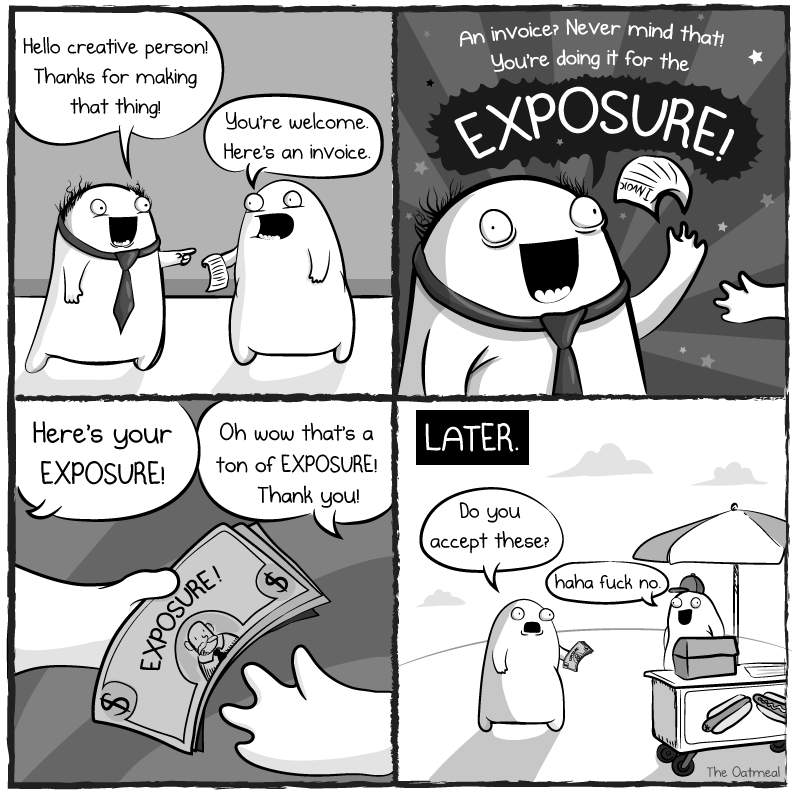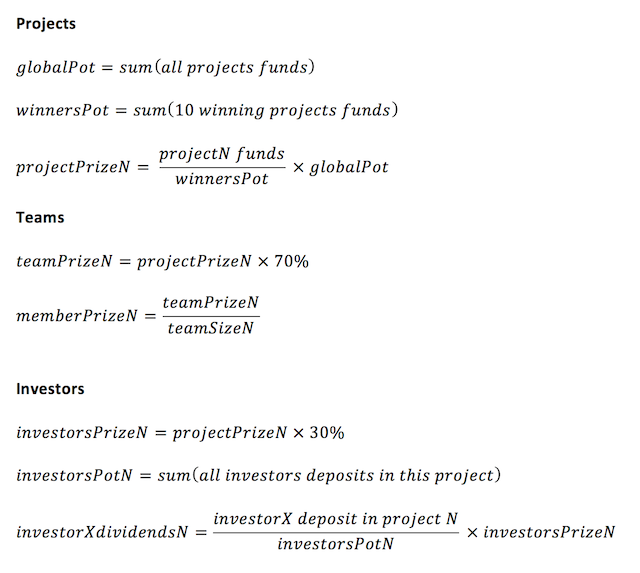Exposure is an Ethereum ERC20 token specifically created for the Pixels Camp participants. Its primary purpose is to help developers get familiarized with the Ethereum Blockchain technology and to foster experimentation of new ideas and applications on top of it.
Our digital coin can be used with many activities around the Pixels Camp event and community, including investing in hackathon projects (which is our spanking new replacement for the voting system), or buying services from other projects. You can see a list of suggested uses below, but our ultimate goal (besides world domination) is to simulate a real life marketplace and attain a Nash equilibrium by leveraging Blockchain as the underlying decentralized and transparent platform.
The symbol for Exposure is EXP.
EXP runs on our Ethereum Testnet and is ruled by a smart contract at the address 0x0ce335bb2d04595c84e3d444675360f64de386e8.
You can interact with and inspect the contract here, and sources are here.
The EXP name was inspired by the famous You're doing it for the exposure cartoon from The Oatmeal.
If you don't know The Oatmeal, then you're a) probably living in a basement and spending too much time on cryptocurrencies or b) missing out big time. Go ahead and support Matthew Inman's work, check out his comics and the shop.
To start using EXP, you first need to get yourself a wallet. In Ethereum, as well as most blockchains, the simplest form of wallet is a public address, which you use to send money/tokens/data to, and a private key, which you should store securely someplace no one can access.
Some wallet applications will use passwords or mnemonics to make things easier for you, but that's just convenience. Deep inside their guts, all they're doing is managing your private key to sign transactions for you.
Two things you need to know:
- The private key generates your public address.
- Anyone with your private key can access your wallet and steal your money or tokens, and there's nothing you can do about it.
There are many ways to create a wallet, and we're pretty sure that soon you'll be digging into the command line and hacking away using python or nodejs to manage this task, but for the time being, let's keep it simple. Here are two GUI-based methods to create a wallet without any hassle:
- Create a wallet using the Pixels Camp Wallet (recommended)
- Create a wallet using the Metamask Chrome Extension
There are 6 ways to earn EXP tokens and get them into your account.
- By participating and earning badges. For each badge you earn, you get
EXPs. Each badge equals 100EXPs, but some badges are worth more (ex: the quiz show winners). - By convincing other participants to send you their
EXPs. We don't interfere here - just keep it civil:) - By convincing the angels (the new jury) to invest in you or your project.
- By selling a service in the marketplace by which participants pay you for (same as above, basically).
- By investing in a winning project, and receiving dividends at the end.
- By solving a very special scavenger hunt we are going to set up for you, and accessing a wealthy pot of
EXP. You'll be anEXPwhale!
Just remember that in order to earn tokens, first you must setup your account/wallet and then you must put your public address in your profile page. If you don't do this, then you're out of the market.
You can spend your EXP tokens by:
- Offering them to other participants, for reasons (again, we won't interfere...)
- Investing in the hackathon projects you like the most.
- Buying services from the marketplace.
For the market to work and have liquidity, one must be very careful with the incentives in place. We thought about this for a while and made a few simulations, but to be honest there's a good chance we will be doing it wrong. There's no dangerous place like a hackathon packed with top technology wizards to deconstruct a model you thought would work... on paper.
But again, this is all a big, fun and educational experiment based on the principles of full decentralization and transparency, so even if we blow it, we're also pretty sure you're going to love the process and learn from it, just as we will. Furthermore last year our voting platform was... Slack, so the bar is low.
Here are the rules to create incentives for everyone (some of which were mentioned already), and maintain equilibrium:
- Each badge equals 100
EXPs in the participant's account, but some badges are worth more (ex: the quiz show winners). - You can transfer or accumulate
EXPs to and from other users, smart contracts or projects. - You can buy or sell services using the marketplace.
- There is a special scavenger hunt in place that once solved, will make someone rich. ~50000
EXPs rich! - There are about ~20 angels with 25000
EXPs each to invest. This is the new jury. - The project wallets are owned by Pixels Camp and not by the team that created the project.
- All the
EXPs invested in the projects during the event will stay in their wallets, locked, and can't be used until the end. Think of your project as a crowdfunding campaign. - By the end of the project presentations (30 minutes later) we will take a full snapshop of the Blockchain and run our scripts on it. The block number used to calculate the final results will be made public.
- The 10 projects with more
EXPinvested on them by then, will win the Pixels Camp hackathon and get the prizes. - The
EXPs invested in all the projects will be part of abig potcontrolled by the organization. - The
big potis then divided by the 10 winning projects, in the proportion their funds at count time. For example, if the project 1 had 10x more funds than project 2, then it will receive 10x more from the big pot. Each of the 10 winning projects ends up with awinning pot. - The
winning potis then divided between 70% for the team members, and 30% for the project investors. - Each investor will get a proportion of the total
EXPs they invested in the project. - Each team member will get an equal part of the 70% from
winning potEXPs. - A team member can also be an investor.
- This will act as the return of their investment and will hopefully be a good incentive to put
EXPs in projects that deserve them. To put in other words, if you invested on a winning project, then you will be rich in the end. If not, then you'll lose yourEXPs. - Team members from losing projects get nothing.
- Investors in losing projects lose all their invested
EXPs. - The participants with more
EXPs in the end, after the final dividends distribution, will also win prizes and public recognition for their work as entrepeneurs and investors.
Here's a simple simulation with only 2 winning projects (instead of 10, for simplification):
- At the end of the competition, the sum of all 50 projects funds is 30,000,000
EXPs. This is thebig pot. - Winning project number 1 had 200,000
EXPs at the time of counting. - Winning project number 2 had 100,000
EXPs at the time of counting. - Project number 1 winning pot will be 20,000,000
EXPs. - Project number 2 winning pot will be 10,000,000
EXPs. - Team members from project number 1 will receive 20,000,000 * 70% = 14,000,000
EXPs, divided into equal parts between them. - Team members from project number 2 will receive 10,000,000 * 70% = 7,000,000
EXPs, divided into equal parts between them. - Investor A invested 50,000
EXPs in project 1. He owns 25% of the investor's pool. - Investor A will receive 20,000,000 * 30% = 6,000,000
EXPs * 25% = 1,500,000EXPs. - Investor B invested 10,000
EXPs in project 2. He owns 10% of the investor's pool. - Investor B will receive 10,000,000 * 30% = 3,000,000
EXPs * 10% = 300,000EXPs.
These formulas might help too:
Here is a list of tools that will help you navigate through the world of Blockchain:
- Pixels Camp Wallet, and how to setup your wallet.
- Block explorer, based on Etherchain light.
- ERC20 explorer, source here.
- Example scripts and code snippets to get you started with advanced stuff.
Our Testnet runs on Azure, courtesy of Microsoft Portugal. It has 4 nodes, 2 of which are mining (geths), and the other 2 are used to expose the RPC interface (geth) and support the block explorers (parity).
We've tuned the network dificulty to mine new blocks very frequently, every 10 seconds or so.
The RPC interface lives at: http://moon.pixels.camp:8545
Please don't abuse the Testnet with DDoS requests, unnecessary traffic or other possible exploits. This is a big experiment built for the Pixels Camp community to learn and have fun, not for profit and hacking purposes. We know it's tempting, but be cooperative.
If you want to know more about Ethereum, we suggest you start here:

